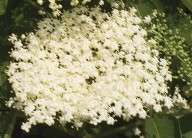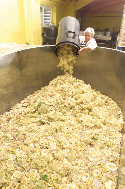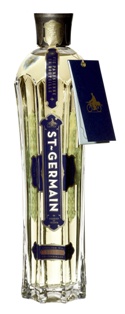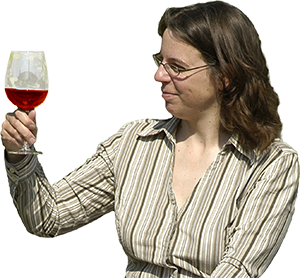 Shear your sheep, they say in Devon, when the elder blossoms peep. With buds appearing at the end of May, the clotted-cream coloured heads of the elder bush are ready for picking by the first week of June.
Shear your sheep, they say in Devon, when the elder blossoms peep. With buds appearing at the end of May, the clotted-cream coloured heads of the elder bush are ready for picking by the first week of June.
If you want to turn elderflowers into a delicious wine, now’s the time to get picking. Look along the edge of any footpath, or corner of a field, and you’ll find the gangly many-stemmed Sambucus nigra bearing hundreds of tiny elderflower blossoms arranged in heads the size of an outstretched hand.
Folklore says that after rain the flowers take on the characteristic urinal smell of tom-cats, but I have never noticed it. In 1998 the elderflowers I picked in rain-sodden Otford, Kent made an award-winning wine. Fully opened elderflowers give off an overwhelming vanillary-citrus scent: sniff out the ripest because they are the best. My damp elderflowers were turned into wine by placing ten flower heads into a large bowl and pouring over a kettle-full of boiling water. I added the juice and rind of two lemons and a pound and a quarter of sugar, then sprinkled in a teaspoon of wine yeast (available from homebrew shops) when the mixture had cooled. After five days the elderflowers were removed and a couple of weeks later the immature wine was bottled. It was ready by Christmas.
My damp elderflowers were turned into wine by placing ten flower heads into a large bowl and pouring over a kettle-full of boiling water. I added the juice and rind of two lemons and a pound and a quarter of sugar, then sprinkled in a teaspoon of wine yeast (available from homebrew shops) when the mixture had cooled. After five days the elderflowers were removed and a couple of weeks later the immature wine was bottled. It was ready by Christmas.
 If you can’t wait that long, why not let someone else do all the hard work? Jerry Schooler, of Lurgashall Winery, sells his vegetarian elderflower wine for £6.95 a bottle.
If you can’t wait that long, why not let someone else do all the hard work? Jerry Schooler, of Lurgashall Winery, sells his vegetarian elderflower wine for £6.95 a bottle.
Schooler arranges for masses of locally-sourced elderflowers to come into his winery during the five-week period in early summer when elderflowers abound. “They must be picked in the sunshine,” says Jerry, “it makes a better product.”
His winemaking philosophy is simple: only the best ingredients will do. “If you use dried flowers it will taste like hay. If you use fresh flowers, it smells so fresh and lovely. You can always tell the difference, always.”
Lurgashall’s wines contain only water, sugar, yeast, and fresh fruit or flowers. Grape juice plays no part in these traditional ‘country wines’. “We are revitalizing a lost tradition,” he says. “Our grandparents all made things which were something other than fermented grape”.
If Lurgashall goes ahead with their mooted elderflower liqueur, they’ll be only the second winery in the world to do so. St-Germain, the world’s first elderflower liqueur, is made by infusing French Alp elderflower – ‘handpicked by gypsies’ – in a sugar solution. This 20% alcohol, £20 bottle gets it alcoholic strength with the addition of watered down eau-de-vie.
 Leave out the distilled ‘water-of-life’ and your elderflower infusion becomes a cordial. With the same sugar-solution thickness and aromas, cordials are a good alternative for those needing liquid elderflower without the alcohol.
Leave out the distilled ‘water-of-life’ and your elderflower infusion becomes a cordial. With the same sugar-solution thickness and aromas, cordials are a good alternative for those needing liquid elderflower without the alcohol.
Belvoir Fruit Farms’ 100-acres of organic elder bushes make up the biggest elderflower plantation in the country, but still can’t produce enough for their elderflower cordials and pressés. Pickers from Lincolnshire, Nottinghamshire, Leicestershire and Yorkshire supplement the Grantham-based drink maker with black plastic bag loads of elderflowers.
Elderflower drinks are an aquired taste. You either love them or hate them. The fresh-cut-flower flavours enjoyed by one palate can seem sickenly cloying to another. To tone-down elderflower levels try cutting your wine or cordial with an equally aromatic white wine. A gooseberry tasting Sauvignon Blanc, or the fortified wine of Martini Bianco works well.
Elderblossoms are peeping now, so why not get out and pick some. More fun than shearing sheep.
PG Wine Tips
 St-Germain Elderflower Liqueur, £18.75 The Whisky Exchange.com
St-Germain Elderflower Liqueur, £18.75 The Whisky Exchange.com
Sip it on the rocks or use as an ingredient in cockails.
Belvoir Fruit Farms Elderflower Cordial, £3.84 (organic version £4.26)
Belvoir Elderflower Pressé, £2.46 (organic version £2.76)
Buy their cordials and pressés online (www.belvoirfruitfarms.co.uk) or from all major supermarkets.
Leave out the alcohol and your elderflower infusion becomes a cordial. With the same sugar-solution thickness and aromas, cordials are a good alternative for those needing liquid elderflower without the headache. Belvoir Cordials are made by infusing elderflowers in their Belvoir estate spring water. The result is sold in 75cl wine-like proportions.
Lurgashall Winery Elderflower Wine, £6.95 www.lurgashall.co.uk
Lurgashall’s wines contain only water, sugar, yeast, and fresh fruit or flowers. Grape juice plays no part in these traditional ‘country wines’. Their elderflower wine is medium sweet and tastes very fresh. The smell is of early-morning flowers.
Tunbridge Wells Winemakers' Circle
If you want to add your name alongside PG’s on the Brookside Novices Cup, enter your homemade elderflower wine into their Annual Show on June 25th.


